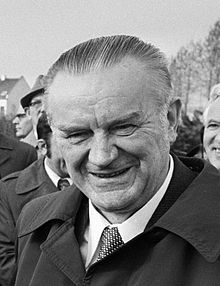Piotr Jaroszewicz
| Piotr Jaroszewicz | |
|---|---|

Piotr Jaroszewicz in 1977
|
|
|
Prime Minister of the People's Republic of Poland 5th Premier of post II WW Poland, 3rd Premier under People's Constitution |
|
|
In office 23 December 1970 – 18 February 1980 |
|
| Vice PM | Mieczysław Jagielski, Franciszek Kaim, Jan Mitręga, Kazimierz Olszewski, Józef Tejchma, Zdzisław Tomal, Franciszek Szlachcic, Alojzy Karkoszka, Tadeusz Pyka, Longin Cegielski, Tadeusz Wrzaszczyk, Józef Kępa, Kazimierz Secomski, Jan Szydlak |
| Preceded by | Józef Cyrankiewicz |
| Succeeded by | Edward Babiuch |
| Personal details | |
| Born | 8 October 1909 Nieśwież, Minsk Governorate, Russian Empire (present-day Belarus) |
| Died | 1 September 1992 (aged 82) Warsaw, Poland |
| Political party |
Polish Workers' Party (until 1948) Polish United Workers' Party |
| Spouse(s) | Alicja Solska |
| Profession | Teacher, Military |
Gen. Piotr Jaroszewicz (['pjɔtr jarɔˈʂɛvit͡ʂ]; 8 October 1909 – 1 September 1992) was a post World War II Polish political figure. He served as the Prime Minister of Poland between 1970 and 1980. After he was forced out of office he lived quietly in a suburb of Warsaw until his brutal, still unsolved 1992 murder.
Jaroszewicz was born on 8 October 1909 in Nieśwież, in the Minsk Governorate of the Russian Empire (present-day Belarus). After finishing the secondary school in Jasło he started working as a teacher and headmaster in Garwolin. After the outbreak of World War II and the Nazi-Soviet alliance established by the Molotov–Ribbentrop Pact he moved to Soviet-occupied zone of Poland. It has been claimed that he was a headmaster in Pinsk gymnasia. However, on 10 July 1940 he was deported to Slobodka, Krasnoborski raion, Arkhangelsk, from Stolin together with his first wife Oksana Gregorevna (born in Salov/Calow 1914) and daughter Olila (born 1940). In 1943 he joined the 1st Polish Army of Gen. Zygmunt Berling. The following year he joined the Polish Workers Party and was promoted to deputy political commander of the 1st Army.
After the war he became the deputy minister of defense (1945–1950). Since 1956 he was the Polish ambassador to COMECON. At the same time between 1952 and 1970 he served as a deputy Prime Minister of Poland and briefly (1954–1956) as the minister of mining industry. Jaroszewicz was a member of the Central Committee of the Polish United Workers' Party since its creation in 1948 and since 1964 he was also a member of the Political Bureau. From December 1970 until February 1980 he was the Prime Minister of Poland. The economical policies of Jaroszewicz and Edward Gierek led to a wave of protests in 1976 and 1980. In 1980 he gave up all his party posts and was expelled from the party the following year.
...
Wikipedia
